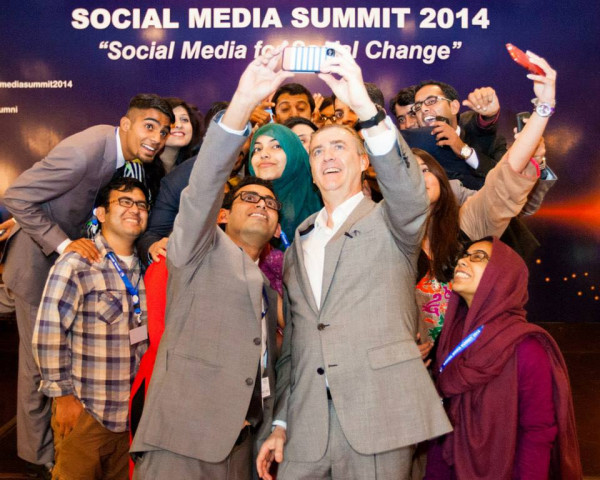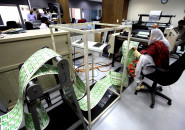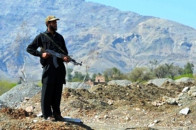Social media: Regulate the virtually real world, say panellists
Summit aims to enable participants to express their opinions on important issues.

US Ambassador to Pakistan Richard G. Olson upon his arrival invited participants to join him on stage to take a selfie for the first time. PHOTO: US EMBASSY FACEBOOK PAGE
To highlight the importance of digital empowerment, social media gurus from across Pakistan came to the opening session of the two-day Social Media Summit 2014 here Saturday evening.
A packed hall buzzed with energy and anxious fingers on gadgets were live tweeting about the event. “It’s about tweets and selfies,” said Jennifer McAndrew, an official of the US Embassy.
US Ambassador to Pakistan Richard G. Olson upon his arrival invited participants to join him on stage to take a selfie for the first time. Crammed on stage, subtly elbowing for space, the picture was up on social media within minutes.
The summit brought together more than 300 participants, speakers, experts and social media gurus, students and bloggers to discuss the emerging trends of social media in Pakistan and its influence on new generation. Progressive Youth Forum (PYF) General Secretary Abdullah Dayo, opening the session, stressed on the need for social media to be a platform for change. Experts were of the view that it will take several years for the social media scene in Pakistan to mature enough to have a tangible effect on governance and policy.
The first session was moderated by Anchor Sidra Iqbal. Journalists Dr Moeed Pirzada, Wusatullah Khan, Nasim Zehra and Blogger and Social Media Director Faisal Kapadia stirred an interesting debate on Social Media in Pakistan its Perceptions and Realities.
Kapadia while speaking about social media’s impact said that language was one of the hurdles. “If we switch over to Urdu, we can make that impact,” he said. Kapadia said that over the recent years, there was an increase in the number of people from rural areas that were accessing social media in Pakistan. While mainstream media cannot be challenged as openly as social media, it was an interactive platform to self-correct, interact, learn and create a change. “We managed to raise money for Thar victims by just sending out a few tweets,” he added.
Zehra termed social media as a powerful tool in today’s time. While speaking about accessibility, Zehra said that social media was catering to several groups including religious groups to come on one platform and debate openly. “It is how you use this tool,” she said.
Pirzada said that social media was empowering a community in Pakistan, however to challenge the dark side of social media there was a need for regulation. “This world has become a cyber jungle and one has to regulate oneself,” said Wusatullah Khan.
The summit is designed to enable participants to improve their online-communications skills, express their opinions on different forums, and create awareness about important issues.
Social Media Summit is a joint initiative of PYF and Pakistan-US Alumni Network.
Published in The Express Tribune, March 30th, 2014.


















COMMENTS
Comments are moderated and generally will be posted if they are on-topic and not abusive.
For more information, please see our Comments FAQ